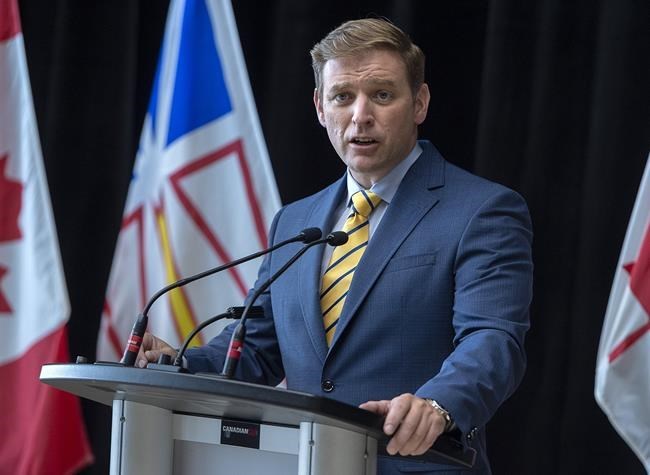
Newfoundland and Labrador Premier Andrew Furey fields a question at the Confederation Building in St. John's, N.L., on Wednesday, July 28, 2021. THE CANADIAN PRESS/Andrew Vaughan
Republished September 28, 2021 - 2:01 PM
Original Publication Date September 28, 2021 - 7:36 AM
ST. JOHN'S, N.L. - Newfoundland and Labrador is aiming to introduce new COVID-19 health measures next week, including a vaccine passport and mandatory vaccination for public employees, in an effort to beat back the Delta variant.
In the meantime, the province's acting chief medical officer of health, Dr. Rosann Seviour, announced heightened travel restrictions for partially vaccinated travellers and an end to unrestricted travel from the other three Atlantic Canadian provinces.
Public health officials are grappling with community spread in Newfoundland's central region, where there are now two distinct outbreaks. Seviour said 143 of the 159 active reported cases in the province are in the central region, and most are associated with the outbreaks on the Baie Verte peninsula and around the community of Twillingate, both on the island's northeast coast.
"This, combined with several other clusters in recent weeks, is putting significant demand on our frontline public health resources for contact tracing," Seviour told reporters on Tuesday. "When public health capacity is overwhelmed, this is a signal that we need to strengthen our public health measures."
As of Thursday, partially vaccinated travellers from outside the province will have to self-isolate for at least a week and then produce a negative COVID-19 test — the same rules now in place for unvaccinated travellers.
Premier Andrew Furey said the province is in talks with public sector unions about mandatory vaccinations, and he hopes they'll have policies in place next week. "It's not a decision that any of us wanted to make," he said, adding that vaccination rates need to increase in order to achieve herd immunity. "We do have a responsibility to protect the public, first and foremost, and that's why we made this decision."
Vaccine passports to be introduced next week will be mandatory "for all non-essential activities throughout our province," Furey said. The system will use QR codes, much like the technology adopted by Quebec, officials explained, adding that consultations with business owners will be ongoing throughout the week.
Seviour reported 14 new cases of COVID-19 Tuesday, noting 80 per cent of Newfoundlanders and Labradorians aged 12 and over are now fully immunized against the disease. That was a key target in the province's reopening plan, but the higher transmissibility of the Delta variant requires about 90 per cent of the population to be fully immunized before the province is protected from outbreaks and community spread, she said.
Vaccination rates vary considerably across the province, with just 67 per cent of the eligible population fully immunized in Baie Verte, where a personal care home became the epicentre of one of the central region outbreaks. When asked if the province was keeping track of vaccination rates among health-care and long-term care workers, Health Minister John Haggie said it was complicated.
"What we do know, in general, is that the vaccination rate of health-care workers tends to mirror the vaccination rate of the communities in which they live and work," Haggie said.
Furey also reported that Alberta has, for now, declined his offer of medical help as its COVID-19 cases mount. Alberta Premier Jason Kenney “has asked us to stand down at this time,” Furey said.
In an email Tuesday, Kenney’s acting press secretary Harrison Fleming said the offer was appreciated and Alberta health officials expect pressure to grow on provincial health-care resources and perhaps peak in late October. “Discussions continue between officials on potential deployment of a medical team from Newfoundland and Labrador, potentially to the Fort McMurray Hospital,” Fleming wrote.
This report by The Canadian Press was first published Sept. 28, 2021.
News from © The Canadian Press, 2021